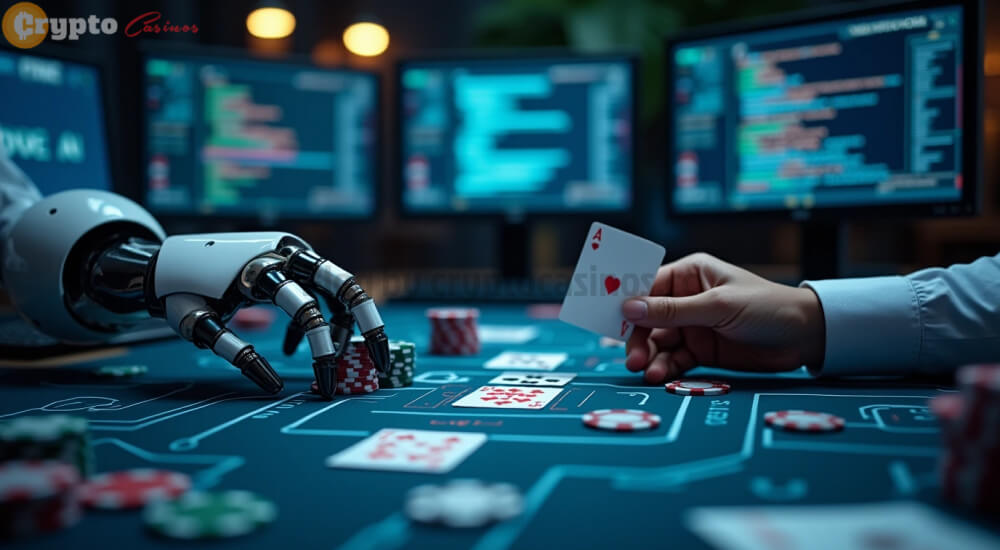The Evolution of AI in Poker
Poker, particularly Texas Hold’em, presents unique challenges for AI:
- Incomplete Information: Unlike chess or Go, where all pieces are visible, poker involves hidden cards, bluffing, and psychological strategies.
- Complexity: A poker game has an astronomical number of possible scenarios, making it a complex problem for AI.
Key Milestones
- Cepheus (2015): Developed by the University of Alberta, Cepheus was the first AI to solve Heads-Up Limit Hold’em. It played at or near an equilibrium where no player could benefit from changing strategy if the other played optimally.
- Libratus (2017): Carnegie Mellon University’s Libratus became famous for beating four top human professionals in a 20-day, 120,000-hand competition in Heads-Up No-Limit Hold’em. This was significant because the limit adds another layer of complexity due to the freedom in betting sizes.
- Pluribus (2019): Also from Carnegie Mellon, in collaboration with researchers at Facebook AI, Pluribus achieved a groundbreaking feat by consistently defeating human professionals in six-player No-Limit Texas Hold’em. This was the first time AI had beaten humans in a multiplayer setting, showcasing AI’s ability to manage the increased complexity with multiple opponents.
How AI Beats Poker
- Machine Learning and Deep Learning allow AI to learn from vast amounts of data or through self-play, refining strategies over time. AI systems like Pluribus train by playing against themselves and discovering optimal strategies, such as bluffing and unpredictability.
- Game Theory Optimal (GTO) Play: AI uses concepts like Nash Equilibrium to find a strategy that no player can gain by changing only their strategy while others keep theirs unchanged. This leads to what’s known as GTO play, which makes the AI’s strategy unbeatable in the long run if played perfectly.
- Limited Lookahead and Abstraction: AI doesn’t look at every possible outcome due to computational limitations. Instead, it uses abstraction (simplifying the game state) and limited lookahead, focusing on likely scenarios to make real-time decisions.
- No Tells: Human players read physical or behavioral cues (tells), but AI has no such signals to give away its strategy, maintaining a perfect “poker face.”
Challenges and Limitations
- Adaptability: While AI can play optimally against a strategy, human players can adapt, introducing new and unpredictable tactics that AI might not have encountered in training.
- Human Intuition: Poker involves psychological warfare, which includes reading opponents beyond the cards. AI might excel at probability but struggles with the nuanced human aspects, like discerning when a player is bluffing based on subtle cues.
- Ethical and Practical Use: Using AI in live settings or as an aid in online environments raises issues of fairness and the potential for cheating.
The Impact on Poker
- Learning and Strategy Evolution: Human players have learned from AI, adopting some strategies and understanding optimal play better.
- Rise of AI-Assisted Tools: Tools like PioSolver for poker strategy analysis are now standard, blurring the line between human skill and AI assistance.
- Potential Decline in Online Poker: If AI becomes too dominant, there’s a fear that it could lead to a decline in online poker, as players might distrust the fairness of games.
Conclusion
AI has proven it can beat poker and has done so at levels once thought to be the exclusive domain of human intuition and psychology. From Heads-Up to multiplayer games, AI’s success in poker is a testament to the power of machine learning and game theory in handling games of incomplete information.
However, poker’s human element, the thrill of outwitting opponents, and the evolving nature of strategy suggest that while AI can dominate, the game will continue to adapt, ensuring poker remains challenging. As AI advances, the future of poker might see a fascinating dance between human ingenuity and computational prowess, each pushing the other to new heights.












